高一牛津译林版英语必修三课件:Unit2Languagereading(共21张)
合集下载
高中英语牛津译林版必修三 Unit2 Extended Reading 课件(共20张PPT)
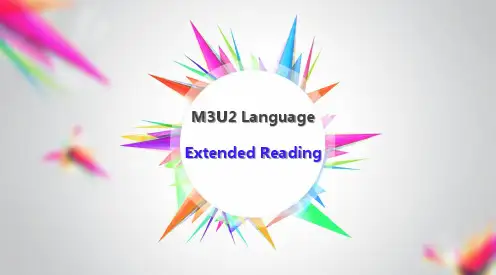
Reading: My teacher ----By Helen Keller
Skimming
II. Main idea for each part
Part 1 (Para 1): ___H__e_le_n__’s__s_it_u__a_t_io_n__b__e_f_o_r_e__A_n__n_ie__c_a__m_e__t_o__H__e_l_e_n_’s__h__o_u_s_e_._________ Part 2 (Paras 2-5):W__h_a_t__h_a_p__p_e_n_e_d___to__H__e_l_e_n__a_f_t_e_r_A__n_n__ie__c_a_m__e__t_o__H__e_le_n__’s__h_o__u_s_e_. Part 3 (Paras 6-9): __B_a_c_k_g__ro__u_n_d__i_n_f_o_r_m__a_t_i_o_n__f_o_r__A_n__n_ie__’s__b_e_c_o__m__in_g__H__e_l_e_n_’_s_t_e_a__c_h_er Part 4 (Paras 10-11) : A__n_n_i_e_’s__h_e__lp__i_n__H_e__le_n__’s__s_c_h_o_o__l_e_d__u_c_a_t_io__n_.__________________ Part 5 (Para 12): ___H__o_w__A__n_n_i_e__h_e_l_p_e_d__H__e_l_e_n__t_o__s_p_e_a__k_.____________________________ Part 6 (Para 13): ____A_n_n__ie_’_s__in_f_l_u_e_n__c_e__o_n__H_e__le_n__. ___________________________________
牛津译林版高中英语必修三Unit 2《Language》(reading)课件
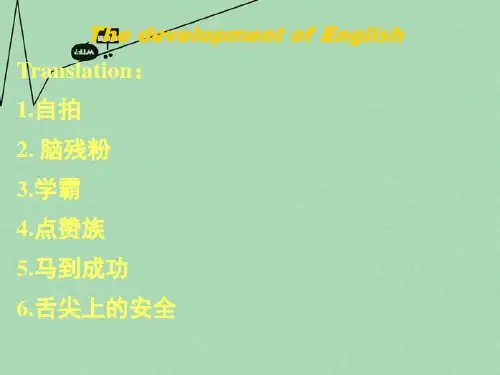
2. Modern English began to develop in the ___________.
3. Almost everyone in England began to speak Middle English in the ____________.
Fill in the blanks with the following dates from the passage.
The development of English
Translation: 1.自拍 2. 脑残粉 3.学霸 4.点赞族 5.马到成功 6.舌尖上的安全
The development of English
Translation: 1.自拍 selfie 2. 脑残粉 3.学霸 4.点赞族 5.马到成功 6.舌尖上的安全
2. Modern English began to develop in the 1_6_t_h_c_e_n_t_u_r_y_.
3. Almost everyone in England began to speak Middle English in the _1_4_t_h_c_e_n_t_u_r_y_.
4. At the end of the _9_t_h_c_e_n_t_u_r_y, Norwegian words began to be used in the English language.
5. The Normans occupied England in ___________
6. By the ____________, people in England used Old English as the official language.
3. Almost everyone in England began to speak Middle English in the ____________.
Fill in the blanks with the following dates from the passage.
The development of English
Translation: 1.自拍 2. 脑残粉 3.学霸 4.点赞族 5.马到成功 6.舌尖上的安全
The development of English
Translation: 1.自拍 selfie 2. 脑残粉 3.学霸 4.点赞族 5.马到成功 6.舌尖上的安全
2. Modern English began to develop in the 1_6_t_h_c_e_n_t_u_r_y_.
3. Almost everyone in England began to speak Middle English in the _1_4_t_h_c_e_n_t_u_r_y_.
4. At the end of the _9_t_h_c_e_n_t_u_r_y, Norwegian words began to be used in the English language.
5. The Normans occupied England in ___________
6. By the ____________, people in England used Old English as the official language.
译林英语必修3Unit2Reading课件(共33张PPT)
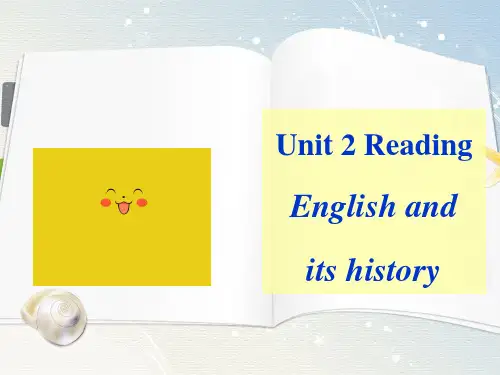
d__e_f_e_a_te__d_ the British in 1781
and gained independence, they
wanted to make the spelling of
English words simpler.
_T_h__e_r_e_f_o_r_e_, Americans write
English
Part 3: Modern English
1. When did Modern English appear?
It appeared during the Renaissance in the 16th century.
2. Which two words are included in Modern English?
Question:
Before the middle of the 5th century, which language did British people speak?
They speak Celtic.
Then, who moved from European mainland to Britain? Two Germanic groups called Angles and Saxons.
They spoke French.
3. Which language is more popular among common people?
2. Did Normans influence English is
English as much as
more popular.
Angles-Saxons?
color instead of colour.
and gained independence, they
wanted to make the spelling of
English words simpler.
_T_h__e_r_e_f_o_r_e_, Americans write
English
Part 3: Modern English
1. When did Modern English appear?
It appeared during the Renaissance in the 16th century.
2. Which two words are included in Modern English?
Question:
Before the middle of the 5th century, which language did British people speak?
They speak Celtic.
Then, who moved from European mainland to Britain? Two Germanic groups called Angles and Saxons.
They spoke French.
3. Which language is more popular among common people?
2. Did Normans influence English is
English as much as
more popular.
Angles-Saxons?
color instead of colour.
牛津译林版高中英语必修三unit2《Language》课件-reading
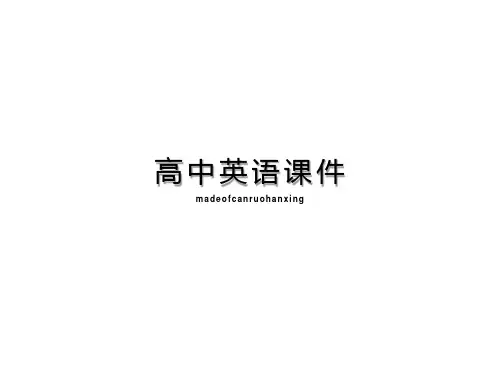
Austrian zoologist
Karl von Frisch
the language of bees
A circle dance A wagging dance
Food is near.
Food is far away.
In the morning if a feeding place is set up 3 kilometers to the east of the hive, which picture correctly shows honey bee’s dance.
3.No. it was Shakespeare who made this expression well known but it had appeared hundreds of years before he wrote the play Julius Caesar. 4.Double Dutch, it’s all Greek to me, and Chinese puzzles have similar meanings. They can all be used to say you do not understand or know something.
The second invasion
Time: At the end of the 9th century
Changing: Anglo-Saxon
Old English
Question
What happened in the 10th century?
Old English was the official language of England .
Reading B: Double Dutch: A Dutch uncle: I’m a Dutchman: It’s all Greek to me: Take French leave: Chinese puzzles:
牛津译林版高中英语必修三英语Unit2Reading课件
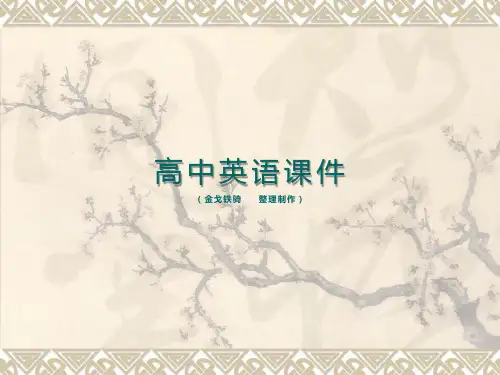
raise
adopt
be made up of
The medical team was made up of
twelve doctors. 医疗队由十二名医生组成。 make up 1. 编造 整个故事都是虚构的。 The whole story is made up. 2. 补足,弥补 We need $50 to make up the loss. 我们需要五十元以弥补损失。 3.化装 她花了一个多小时才打扮好。 It took her more than an hour to
7. By the 1_0__t_h__c_e_n__t_u_r_y_, Old English was the official language of English.
Reading strategy: reading a history article
What should you notice? Why?
pick up
1. The boy picked up the hat for the old man. 男孩替老人拾起了帽子。
2. Where did you pick up your technical skill? 你的技术是在哪儿学的?
because the animals were raised
and cooked by English servants.
4. English was used for all official
occasions after tHheenNryorⅣmabnecame
thCeokniqnugeosft.England.
house—houses
Discussion:
nguages borrow words from each other. List some. e.g. Chinese words from English:
高一牛津译林版英语必修三课件:Unit 2 Language Language points(共30张PPT)
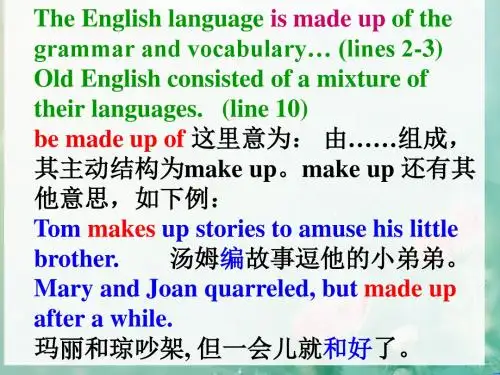
mix with
油不融于水。Oil doesn't mix with water.
mix up 弄错,弄乱,搞错 His explanation just mixed me up more. 他的解释令我更加糊涂了。 I always mix up the twins. 我总是把这对双胞胎弄混。 the mixture of different people living in a city 生活在城市中的形形色色的人的混合体 She is mixing the mixture of flour and water. 她正在搅拌面粉和水的混合物。 mixture n. 混合物;混合体
翻译下列句子。
这个研究小组由两名中国科学家和三名美 国专家组成。 The research team consists of two Chinese scientists and three American experts. 联合王国包括大不列颠与北爱尔兰。 The United Kingdom consists of Great Britain and Northern Ireland. 这种机器由20个零件组成。 The machine is made up of 20 parts.
vt. 占领;占用(时间、空间等) 拓展:occupy oneself in/with或be occupied in/with,意为“使忙碌,使从事, 使全神贯注于”。
完成下列句子。 occupied himself in playing ①The child __________________________ piano (只顾着弹钢琴). _______ have occupied ② The striking office workers ___________ the whole building (已经占领了整座大 _________________ 楼). is fully occupied with her ③ Her time _________________________ three children (全部用在她的三个孩子身 _____________ 上了) .
油不融于水。Oil doesn't mix with water.
mix up 弄错,弄乱,搞错 His explanation just mixed me up more. 他的解释令我更加糊涂了。 I always mix up the twins. 我总是把这对双胞胎弄混。 the mixture of different people living in a city 生活在城市中的形形色色的人的混合体 She is mixing the mixture of flour and water. 她正在搅拌面粉和水的混合物。 mixture n. 混合物;混合体
翻译下列句子。
这个研究小组由两名中国科学家和三名美 国专家组成。 The research team consists of two Chinese scientists and three American experts. 联合王国包括大不列颠与北爱尔兰。 The United Kingdom consists of Great Britain and Northern Ireland. 这种机器由20个零件组成。 The machine is made up of 20 parts.
vt. 占领;占用(时间、空间等) 拓展:occupy oneself in/with或be occupied in/with,意为“使忙碌,使从事, 使全神贯注于”。
完成下列句子。 occupied himself in playing ①The child __________________________ piano (只顾着弹钢琴). _______ have occupied ② The striking office workers ___________ the whole building (已经占领了整座大 _________________ 楼). is fully occupied with her ③ Her time _________________________ three children (全部用在她的三个孩子身 _____________ 上了) .
牛津译林必修三unit2 Reading_Language points(共20张PPT)
英语及其历史
有史以来,在不列颠共同生活着来自许多不 同国家和文化背景的人们。英语是由进入不列颠 的这些人所说的语言的语法和词汇构成的。这就 是为什么英语有这么多很难的困惑人们的规则的 原因。
Old English
Old English is very different from the English we speak nowadays. In fact, we would not be able to understand it if we heard it today. Before the middle of the 5th century, people in Britain all spoke a language called Celtic. Then two Germanic groups from the European mainland—the angles and the Saxons— occupied Britain. Old English consisted of a mixture of their languages. (Both the English language and the English people are named after the angles; the word Angle was spelt Engle in old English.) Aside from place names such as London, very few Celtic words became part of old English. At the end of the 9th century, the Vikings, people from Northern European countries such as Denmark and Norway, began to move to Britain. They brought with them their languages, which also mixed with Old English. By the 10th century, Old English had become the official language of England.
译林牛津版高中英语必修3课件 Unit 2 Language Section ⅠWelcome to the unit,Reading 课件
D . The process of English's development will not continue any more.
4.The reason why French didn't have the same result as the first language despite its invasion is that . A.the Norman conquest didn't have the same result as the Germanic invasion had
D.All of the above.
2.The base of Old English is A.Celtic B.Anglo-Saxon
.
C.the languages of Denmark and Norway D.Anglo-Saxon mixed with the languages of Denmark and Norway
3.Which of the following is true about the history of English? A . The language used before the middle of the 5th century is called Old English. B.Middle English started from about the 12th century and ended in the 15th century. C . Only the English we are using today is Modern English.
牛津译林版必修三Unit2 Language ReadingPPT课堂课件(15页)
4. Do you think English will keep on changing in the future? Yes. English will keep on changing in the future.
牛津译林版必修三Unit2 Language ReadingPPT课堂课件(15页)-精品PPT 课件
The English language is made up of the grammar and vocabulary. 3. What are the three kinds of English discussed in the article? Old English Middle English Modern English
我能否将你比作夏天? 你比夏天更美丽温婉。 狂风将五月的蓓蕾凋残,
夏日的勾留何其短暂?
Reading: English and its history
Step2: Reading comprehension
Activity 1. Go through the passage and answer the
events were performed in English.
·Modern English includes many Latin and Greek words.
Modern ·Vocabulary and pronunciatione_x_p__e_r9i_e_n_c_e_d_ huge changes
England
_H__is3t_o__r_y
·In 1066, England was occupied by the Normans. Though old
Frenchc_o_n_t_r6i_b_u__te_d_ to Middle English, French did not take
牛津译林版必修三Unit2 Language ReadingPPT课堂课件(15页)-精品PPT 课件
The English language is made up of the grammar and vocabulary. 3. What are the three kinds of English discussed in the article? Old English Middle English Modern English
我能否将你比作夏天? 你比夏天更美丽温婉。 狂风将五月的蓓蕾凋残,
夏日的勾留何其短暂?
Reading: English and its history
Step2: Reading comprehension
Activity 1. Go through the passage and answer the
events were performed in English.
·Modern English includes many Latin and Greek words.
Modern ·Vocabulary and pronunciatione_x_p__e_r9i_e_n_c_e_d_ huge changes
England
_H__is3t_o__r_y
·In 1066, England was occupied by the Normans. Though old
Frenchc_o_n_t_r6i_b_u__te_d_ to Middle English, French did not take
牛津译林版必修三Unit 2 Language reading (共22张PPT)PPT
Old English
Languages
Celtic
of angles
Languages and Saxons
of Vikings
牛津译林版必修三Unit 2 Language reading (共22张PPT)
牛津译林版必修三Unit 2 Language reading (共22张PPT)
2. From the text, we can learn that ______. A. the plural forms of man and child were
高一英语 English and its history
1.All through history 贯穿整个历史
2.Go through
经历
3.Official language 官方语言
4.Play a part in
起着…的作用, 扮演…角色
5.Result in
导致
6.Make a contribution to 对……有贡献
Periods 牛津译林版必修三Unit 2 Language reading (共22张PPT)
1.__T_im__e____
Old
Before the middle
English of the 5th century
At the end of 3._th_e__9t_h__century
Events People in Britain all spoke a language called2._C__el_ti_c___
牛津译林版必修三Unit 2 Language reading (共22张PPT)
牛津译林版必修三Unit 2 Language reading (共22张PPT)
Languages
Celtic
of angles
Languages and Saxons
of Vikings
牛津译林版必修三Unit 2 Language reading (共22张PPT)
牛津译林版必修三Unit 2 Language reading (共22张PPT)
2. From the text, we can learn that ______. A. the plural forms of man and child were
高一英语 English and its history
1.All through history 贯穿整个历史
2.Go through
经历
3.Official language 官方语言
4.Play a part in
起着…的作用, 扮演…角色
5.Result in
导致
6.Make a contribution to 对……有贡献
Periods 牛津译林版必修三Unit 2 Language reading (共22张PPT)
1.__T_im__e____
Old
Before the middle
English of the 5th century
At the end of 3._th_e__9t_h__century
Events People in Britain all spoke a language called2._C__el_ti_c___
牛津译林版必修三Unit 2 Language reading (共22张PPT)
牛津译林版必修三Unit 2 Language reading (共22张PPT)
- 1、下载文档前请自行甄别文档内容的完整性,平台不提供额外的编辑、内容补充、找答案等附加服务。
- 2、"仅部分预览"的文档,不可在线预览部分如存在完整性等问题,可反馈申请退款(可完整预览的文档不适用该条件!)。
- 3、如文档侵犯您的权益,请联系客服反馈,我们会尽快为您处理(人工客服工作时间:9:00-18:30)。
For auld lang syne, my friends, for auld lang syne, We'll take a cup of kindness yet For auld lang syne.
A red red rose Robert Burns
O, my Luve's like a red, red rose That's newly sprung in June: O, my Luve's like a melodie That's sweetly play'd in tune!
1. The English language is made up of the rules and
2. vocabulary each group of people brought to Britain
2. Middle English is the name given to the English used from around the 12th to the 16th century. (line24)
3. So, the words we use for most animals raised for food, such as ox, cow, sheep and pig, come from Old English, while the words for the meat people eat come from French: beef, mutton, pork and bacon. (p23 line39)
Unit2 Language
Let’s enjoy a song and a poem:
Auld lang syne A red red rose
Auld lang syne
Should auld acquaintance be forgot and never brought to mind? Should auld acquaintance be forgot and days of auld lang syne?
As fair as thou, my bonnie lass, So deep in luve am I: And I will luve thee still, my dear, Till a' the seas gang dry:
Till a' the seas gang dry, my dear, And the rocks melt wi' the sun; I will luve thee till, my dear, While the sands o' life shall run.
True or false:
F
1. Old English consisted of an Anglo-Saxon base plus
words from the languages of FDreennmcahrk and Norway.
2. The words for most animals come from old English
And fare thee weel, my only luve, And fare thee weel a while! And I will come again, my luve, Tho' it ware ten thousand mile.
Why can’t we understand them?
just because the animals were raised and cooked
by English servants. T
3. English was used for all official occasions after
HtheenrNyoⅣrmbaencaCmoentqhueeksitn.g of England.
English is changing all the time…
Unit2 Reading English and its History
Fast reading:
1.Where did the Angles, the Saxons and the Jutes come from?
They came from the European mainland.
F
4. People from different places other though they both speak
English.
T
Language points --- sentence structures
1. The English language is made up of the rules and vocabulary each group of people brought to Britain with them. (p22 line3)
2. Why can similar pairs of words be found in the English language?
Because each word or phrase came from a different language
3. When did Modern English appear? During the Renaissance in the 16th century.
4. The question of whether English will continue changing in the future is easy to answer. (line55)
5. If a person from the south of England goes to the north, he or she may find it difficult to understand what people there are saying. (line57-58)
A red red rose Robert Burns
O, my Luve's like a red, red rose That's newly sprung in June: O, my Luve's like a melodie That's sweetly play'd in tune!
1. The English language is made up of the rules and
2. vocabulary each group of people brought to Britain
2. Middle English is the name given to the English used from around the 12th to the 16th century. (line24)
3. So, the words we use for most animals raised for food, such as ox, cow, sheep and pig, come from Old English, while the words for the meat people eat come from French: beef, mutton, pork and bacon. (p23 line39)
Unit2 Language
Let’s enjoy a song and a poem:
Auld lang syne A red red rose
Auld lang syne
Should auld acquaintance be forgot and never brought to mind? Should auld acquaintance be forgot and days of auld lang syne?
As fair as thou, my bonnie lass, So deep in luve am I: And I will luve thee still, my dear, Till a' the seas gang dry:
Till a' the seas gang dry, my dear, And the rocks melt wi' the sun; I will luve thee till, my dear, While the sands o' life shall run.
True or false:
F
1. Old English consisted of an Anglo-Saxon base plus
words from the languages of FDreennmcahrk and Norway.
2. The words for most animals come from old English
And fare thee weel, my only luve, And fare thee weel a while! And I will come again, my luve, Tho' it ware ten thousand mile.
Why can’t we understand them?
just because the animals were raised and cooked
by English servants. T
3. English was used for all official occasions after
HtheenrNyoⅣrmbaencaCmoentqhueeksitn.g of England.
English is changing all the time…
Unit2 Reading English and its History
Fast reading:
1.Where did the Angles, the Saxons and the Jutes come from?
They came from the European mainland.
F
4. People from different places other though they both speak
English.
T
Language points --- sentence structures
1. The English language is made up of the rules and vocabulary each group of people brought to Britain with them. (p22 line3)
2. Why can similar pairs of words be found in the English language?
Because each word or phrase came from a different language
3. When did Modern English appear? During the Renaissance in the 16th century.
4. The question of whether English will continue changing in the future is easy to answer. (line55)
5. If a person from the south of England goes to the north, he or she may find it difficult to understand what people there are saying. (line57-58)
